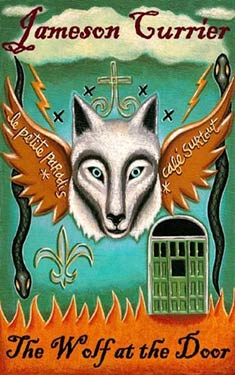Jameson Currier
Completed 2/25/2018, reviewed 2/25/2018
3 stars
I wish I’d visited New Orleans at some point in my
life. It seems a world apart from
anything in my experience. My only exposure
to it is mostly from literature, movies, and TV. The Wolf at the Door is a new book to add to
my list of virtual New Orleans visits.
And while it doesn’t give a grand tour of the city, it certainly has the
tone one would expect from a story about a haunted, gay-owned and operated
guesthouse in the French Quarter. It’s a
fun little book, light-reading with a couple of deep messages thrown in. It was nominated for a Gaylactic Spectrum
Award for positive LGBTQ images in SF/Fantasy/Horror.
 Avery runs a guesthouse and his ex, Parker, runs the adjoining
restaurant. Together they own the
building and run ragged with their businesses, barely keeping their heads above
water. Avery, who drinks, eats, and
works too much, is starting to see ghosts, strange little balls of light, and a
spectral wolf. Are they real, or is it
just the booze? Surrounded by a cast of
gay men and lesbians, Avery tries to get of the bottom of his visions.
Avery runs a guesthouse and his ex, Parker, runs the adjoining
restaurant. Together they own the
building and run ragged with their businesses, barely keeping their heads above
water. Avery, who drinks, eats, and
works too much, is starting to see ghosts, strange little balls of light, and a
spectral wolf. Are they real, or is it
just the booze? Surrounded by a cast of
gay men and lesbians, Avery tries to get of the bottom of his visions.
The interesting thing about the book is that it’s not just a
ghost story, it’s also a personal journey of spiritual rediscovery. Avery grew up in a family of charlatan faith
healers and snake handling evangelists. His
experience of God is not a healthy one. Growing
up gay only made matters worse. Now with
all the ghosties floating around, he soon learns that it’s possible to have a
relationship with God that’s healthy and tangible. I was surprised a little by this. I felt it was introduced a little awkwardly,
but eventually it wove into the story pretty well.
The book also discusses slavery in Louisiana in the 1800s. In addition to the horror that slavery is, we
hear the story of a family full of interracial relationships with its slaves,
the offspring of some are slaves and others are free. It’s really frightening how cruel a family
can be. And the story is based on the
author’s actual research on New Orleans life in the 1800s.
I did have a few problems with the book. Avery reads an old journal from one of the family
that originally owned the building, the family that I described in the
preceding paragraph. It is interesting
at first, but goes on a little too long.
I felt the book dragged in spots during this part. He also reads from an unpublished manuscript which
drags a little. Lastly, there isn’t much
dialogue. A majority of the story takes
place in Avery’s head. Sometimes this drags
a bit too. It does help us understand
though that he is potentially an unreliable narrator. I would have liked to have seen more interaction
with the other people at the guesthouse, though. They were setup interestingly and I thought
could have had a lot more participation in the narrative.
Overall I enjoyed the book.
It’s full of flawed but endearing characters. It’s a quick read despite dragging in a few
parts. I give the book three out of five
stars.
No comments:
Post a Comment